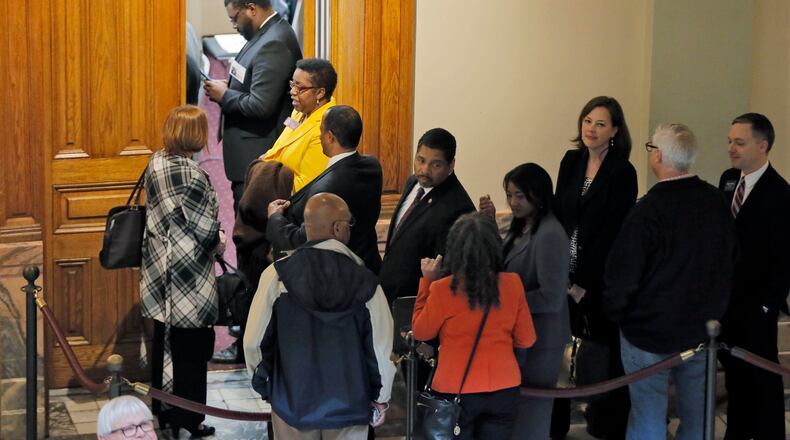The number of women qualifying for public office across Georgia this week jumped significantly compared to the last election, as hundreds of candidates signed up to run for a sweep of state races up for grabs in November.
When the dust settled after the weeklong qualifying period that ended Friday, buoyant Democrats competed in a range of races they had left uncontested in past elections.
The new class of candidates included business executives and film industry gurus, former journalists and stay-at-home moms, civil rights attorneys and entrepreneurs. They said they were infuriated by Donald Trump, frustrated with Georgia politics or simply wanted their voice to be heard.
Here are some takeaways from the Legislature:
- The number of women qualifying to run for the state Senate shot up by about 40 percent from 2016. In the House, the number of female candidates increased by about 25 percent.
- Democrats competed in 82 of 180 House races in the last vote. This year, they'll have candidates in 121 contests – including most of the 14 GOP-held districts that Hillary Clinton carried. It's the largest number of Democratic House candidates since 2004.
- There are three open Senate seats and about 17 open House seats, nearly all vacated by Republicans who are running for higher office or retiring. That includes at least eight departing House GOP committee chairmen.
- Many of the contests against incumbents are uphill battles – even House Speaker David Ralston drew a Democratic challenger for the first time in more than a decade – but Democrats are zeroing in on GOP-held seats in the suburbs.
- One of the juiciest targets outside of metro Atlanta is the seat held by Republican Rep. Gerald Greene. He represents a solidly-Democratic district, and last year was shot in the leg behind an adult cinema. Retired health administrator Joyce Barlow is challenging him.
Candidates for statewide office formally qualified as well. There were no major surprises, though a few big names who were openly considering a run decided against it.
- Nine candidates qualified to run for governor – seven Republicans and two Democrats. That means former House Minority Leader Stacey Abrams and ex-state Rep. Stacey Evans won't have to worry about a runoff; their contest will be decided in May.
- The crowded Republican side includes five leading candidates: Lt. Gov. Casey Cagle, former state Sen. Hunter Hill, Secretary of State Brian Kemp, businessman Clay Tippins and former state Sen. Michael Williams. Two other long-shot Republicans also filed paperwork: Restaurateur Eddie Owens and author Marc Urbach. A July runoff seems likely, though Cagle's supporters say he could angle for an outright win.
- Former state Sen. Vincent Fort decided not to run for Georgia's No. 2 job. That means executive Sarah Riggs Amico and Triana Arnold James will square off for the Democratic nomination. State Sen. David Shafer and former legislators Geoff Duncan and Rick Jeffares are the GOP candidates.
- Another well-known politico, former Atlanta City Council President Ceasar Mitchell, opted not to launch a last-minute run for attorney general. That means Democrat Charlie Bailey will face Attorney General Chris Carr, a Republican, in November.
- Democrats fielded candidates for every statewide office, but one of the most crowded is the contest for state school superintendent. Republican Richard Woods faces a GOP challenge from his predecessor, John Barge, as well as education consultant Sonia Francis-Rolle. Three Democrats are also running.
Credit: Bob Andres
Credit: Bob Andres
Nearly every one of Georgia’s 14 U.S. House members drew an opponent. The lone exception is U.S. Rep. John Lewis, the Atlanta civil rights icon who effectively wins another term.
- U.S. Rep. Karen Handel of Roswell didn't draw a Republican primary opponent after winning the most expensive House contest ever last year. But she did attract four Democrats, including former newscaster Bobby Kaple and gun control advocate Lucy McBath.
- In the neighboring 7th District, a Gwinnett-based territory that's also increasingly competitive, U.S. Rep. Rob Woodall faces seven opponents. Five candidates are targeting U.S. Rep. Jody Hice, who faced but one low-profile opponent in 2016. And two Democrats are competing to challenge U.S. Rep. Doug Collins in deep-red north Georgia.
About the only races that were sleepy were the appellate court contests.
- Court of Appeals Judge John Ellington was the only candidate for an open Georgia Supreme Court seat, meaning he effectively won the contest. And incumbent Justices Michael Boggs, Britt Grant, Harold Melton and Nels Peterson face no opponents.
- The only appellate court race pits former prosecutor Ken Hodges against Ken Shigley for the seat vacated by Ellington.
About the Author
The Latest
Featured





